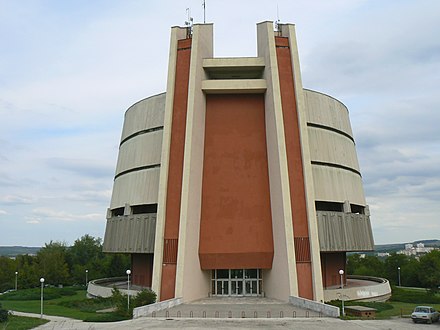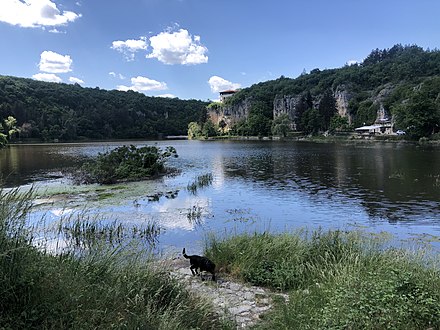Pleven - The seventh most populous city in Bulgaria
Pleven (Bulgarian: Плевен [ˈplɛvɛn]), a.k.a Plevna in Romanian, Plevne in Turkish, is a city in North Bulgaria.
Understand
Pleven is the seventh most populous city in Bulgaria with a bit over 110,000 inhabitants. It is the biggest transportation and industrial centre in North Bulgaria.
Get in
Pleven lies on the Sofia-Varna railway. Trains between Sofia and Rousse, as well as international trains towards Bucharest also stop in the city. Buses between Sofia and Rousse, Bucharest, Svishtov and Silistra also usually make a stop at the bus station in Pleven.
Buses from Sofia depart roughly every hour until 18.00 from the central bus station in Sofia (www.centralnaavtogara.bg) (10-13 BGN one way). Advance purchase of tickets is usually not necessary, except during major holidays. There are a few trains from Sofia every day (www.bdz.bg). These are usually slightly slower than the buses but pass through the beautiful Iskar gorge.
To Lovech there are frequent buses from the bus station in Pleven (tel: +359.64.800.122). It is also possible to take the train there (with a change in Levski), but that takes much longer. The trains continue past Lovech to Troyan.
There are trains and buses to Rousse, trains (and no buses) to Varna and all cities on the railway, buses to Veliko Turnovo, Gabrovo, Svishtov, Razgrad, Belene, Kozloduy.
There are also one to two daily departures to Plovdiv and Bucharest, and at least in the summer to Burgas.
It is possible to cross to Romania through Rousse or with one of two daily buses to Oryahovo, then take the ferry over to Bechet.
Get around
Getting around the city on foot is quite straightforward. The city is split by a long pedestrian street with many shops and service facilities.
There is also an extensive network of buses and trolley-buses. A single ticket costs 1,50 BGN (Aug. 2022) and you pay to a person who will approach you once you've boarded and taken a seat. Main trolley bus lines are numbers 3 and 7 (running between Storgozia and Kaylaka, passing close to the train and bus stations) and numbers 9 and 5, which run between the train/bus station and Druzhba. Easyway journey planner helps to find routes and schedules.
Taxis are generally cheap. You would normally not pay more than 4 BGN within the city (feb 2012). Make sure the driver puts the meter on. There are numerous taxi stands in the centre and around many bus stops. You can also call a taxi (some numbers: 064 / 88-89, 064 / 88-00, 064 / 81-55-55), but do not expect them to speak much English.
See

 Regional History Museum. The Historical Museum in downtown Pleven hosts many exhibitions, including one on the famous Bulgarian soprano Ghena Dimitrova.
Regional History Museum. The Historical Museum in downtown Pleven hosts many exhibitions, including one on the famous Bulgarian soprano Ghena Dimitrova.
Pleven Panorama. By far the most popular sight of Pleven. It depicts the events of the Russian-Turkish War of 1877–78, specifically the five-month Siege of Plevna (Pleven Epopee) which made the city internationally famous and which contributed to the Liberation of Bulgaria after five centuries of Ottoman rule. At the ticket booth, you can book a personal tour in English, which will give you a good overview of the battle and its context. The tour is very affordable and definitely worth your while.
During the summer the many fountains and a water cascade on the central pedestrian street are a favourite place for relaxation among locals.
Pleven is famous for its Kaylaka (where the ruins of the Storgosia fortification can be found) and Skobelev parks. The latter is home to the Pleven Panorama and was where most of the battles took place. The Kaylaka park is very popular among locals. There is a zoo, a pond where you can rent a boat and row, tennis courts, bicycle lanes, perfect places for picnics or playing games. There are a few hiking trails around, up to some cliffs and caves. It's also the location of the wine museum, which is very much worth a visit. If you want to spend a couple of days relaxing in the park, also consider staying at the nearby hostel. From the city you can either walk or take trolley buses 3 or 7 to their last stop.
A very interesting and somewhat underestimated sight is the 'Svetlin Rusev Donative Exhibition' (Bulgarian: Изложба-дарение „Светлин Русев“, Izlozhba-darenie „Svetlin Rusev“), which includes the personal collection of the famous Bulgarian artist. It includes works by Pablo Picasso, Francisco Goya, Honoré Daumier, Marc Chagall, Maurice Denis, Pierre-Auguste Renoir, Salvador Dalí and Renato Guttuso, among others. Admission is free!
Outside the village of Gigen, close to Pleven, lie the ruins of the Roman town of Oescus.
Do
Buy
Eat
- Pizzeria Signorina (пицария Синьорина), ул. Ал.Стамболийски 1 (very close to the military club (see Sleep section), up the street on the left side.). Good pizzas and other meals. The place is known for displaying the two largest jigsaw puzzles in the world (36000 and 24000 pieces).
- Top Table offers modern cuisine in an upmarket cafe atmosphere.
Drink
- Havana Bar
- Dumfies Bar some live music with a cover charge
Sleep
There are a few hotels in the city and not many budget options such as hostels. The cheapest option is a hostel (tourist house) in the Kayluka park, outside of the city.
One of the two best known hotels in the city, catering mostly to the business crowd, is Balkan (http://hotel-balkan.com/index.php?lang=en (dead link: August 2018), has prices from €15 per person). 3-star.
- Rostov The other best known hotel Rostov (http://www.rostov.bg/), three star. Has a bar and breakfast restaurant. 53BGN for a single or 60BGN with breakfast (2022).
- Military Club (Военен Клуб), main square (at the far end of the main square, opposite the municipality building, close do Doyran blvd), 43.40762°, 24.61731°, +359 64 831367. Very central location. Basic rooms in the military club (rated as a 1 star hotel). 50 BGN for a single, 60 BGN for a double room (Feb 2012). s. 50/d. 60
- Hostel Kaylaka (Туристически дом Кайлъка), park Kaylaka (It is a bit out of town, close to the entrence to the beautiful park Kaylaka. You can take trolley bus nr. 7 or 3 to the last stop and walk from there ), +359 64 83 43 52, +359 878 75 80 37 (mobile). Basic hotel, accommodating mostly groups. Has a restaurant. Cheapest option in Pleven. Very important: If you ask for directions or take a taxi, make sure they do not confuse it with a way more luxurious hotel Kaylaka, which is further away inside the park. 20-70 BGN. Single room: 20/30 BGN (with/without TV), Double room: 45 BGN, Triple room: 50 BGN, Quadruple room: 55 BGN, Apartment: 70 BGN
- Hotel Face, 12 Svoboda sq./площад Свобода 12 (very central, on the main pedestrian street, across from a restaurant called Speedy), +359 64 801 613. Small and clean rooms. Perfect location. 50-100 BGN (single, double, apartments)
Connect
Internet cafés are hard to come by these days but there is free wifi virtually everywhere around the main street. Most cafés will have an open wifi network and there are open public wifi networks, which are free for one or two hours of use.
The main post office is in the southeast corner of the main square, next to the municipal building with the clock.
Go next
The spa towns of Chiflik or Ribaritsa are good stops, if you are up for some bathing and relaxation.
Pleven
pleven.bg/enObshtina Pleven
2nd-order administrative division
Pleven
Primary administrative division